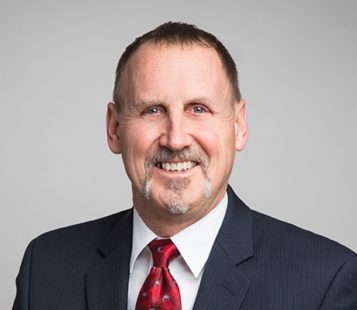
It begins with a can-do, will-do attitude every time
By: Chris Maday Schmidt
Coleby Cyrtmus began his construction career as a carpenter, and he joined HITT as a superintendent in 1988. Promoted to vice president of site operations in 2015, he brings more than 40 years of construction experience to the company’s projects. Cyrtmus was an instructor in ABC Virginia’s Carpentry Apprenticeship program and is actively involved in training programs at HITT. Join Construction Superintendent as Cyrtmus bridges the gap between old-school and new-school industry insights.
(Q) Talk a little about what your role as VP of site operations entails and how you still play an integral part on the jobsite.
My day-to-day role is pretty much that of a superintendent. The differences are the size of the project and the size of my staff onsite. At HITT, we run such a huge diversification of project size, and the range of talents and abilities of our superintendents is so diverse, that we found it necessary to create a higher level for people that can manage large-scale operations. I report to work every day to the jobsite and interface with subcontractors, suppliers, architects, MEP engineers and construction managers. I typically have a staff of superintendents, assistant supers and project engineers that handle various components of the project. As a company executive, I have some other obligations that run the gamut from training to supporting in development and innovation of our programs, some field visits to our satellite offices from time to time and some support for marketing as needed (like this article).
(Q) What led to your career as a carpenter, and what type of experience did you bring to HITT as a superintendent three decades ago?
When I was six, my father was in the Marine Corps and we lived in a trailer park in North Carolina. There were four kids, and my folks bought a pre-fab “aluma-room” from Sears Roebuck. They hired a contractor to build a deck and assemble this addition onto our trailer. I remember the carpenters laying out the piers, mixing the concrete, laying the block and framing the deck. When the guy got out a chalk box and struck a line on the plywood, I understood it. I thought: this must be the smartest guy in the world. I wanted to be that guy. I worked in every phase of construction and learned about building from the ground up. By the time I arrived at HITT, I was 30 years old and had 13 years of experience.
(Q) In your opinion, what is the single most critical element as far as mentoring your team members?
Teaching from the ground up, nuts and bolts, hammers and nails, footings to framing. Few of the people we hire have the kind of “building is in my blood” that previous generations had. My grandfather’s generation built their own homes, sheds and barns. Boys and young men had to take a broken-down, three-hand Chevy and had to keep it running. The guys I grew up with learned from their fathers or their big brothers how to rebuild an engine or replace a voltage regulator. Now we buy ready-built homes, pre-manufactured sheds and we don’t build many barns. The Gen Xers and the Millennials just have not had the exposure to hands-on mechanical skills that prior generations had. So we are starting with a rougher diamond. Takes a lot of polishing to get them to “think like a carpenter.”
(Q) Share a little about your most noteworthy mentoring experience.
I had a new-hire administrative assistant out on a site to help out. I had been talking with my drywall foreman about some layout issues. After the foreman walked away, the new hire asked, “When you are talking about ‘studs,’ just what do you mean?” I knew I had my work cut out for me. The guy went on to become a pretty solid project manager.
(Q) What kind of attitude has positioned you to get the job done right and on time, every time?
I have been blessed with a will to succeed, and an ability to motivate people. This is the most valuable skill any manager can possess. People respond to an “appeal” better than they do to a “demand.” At HITT Contracting, we ask people every day to work harder, faster, neater, cleaner and quieter than they normally do. You can’t get them to buy into that by verbal abuse or ridiculous demands. You have to motivate them.
(Q) How do you apply this attitude to each facet of your role?
I try to make every person on the job feel like they are an invaluable part of the bigger machine. I have found the phrase, “I need you…” to be of tremendous value in getting people to want to help, to want to be part of the solution. Human nature compels us to want to be a useful part of something bigger than us and guys on the job are no different.
(Q) What is the biggest innovation you’ve experienced since you began your work in the construction industry?
Technology. Like every part of our lives, it has changed the way we do everything.
(Q) How has that changed the way you do your job?
When I started in 1974, the beacon laser was just starting to replace the water level, and the transit was the most technical piece of equipment we used. Now we BIM the whole project in 3D, coordinating 10 trades before we put the first product in place. I can carry every document for 10 projects around with me via cloud-based construction management software.
Plans, submittals, project directory, shop drawings, phone lists, etc. — it is all right in the palm of my hand in my cellphone. I don’t need to walk back to my office to pull a cut sheet for a rooftop AC unit when I just climbed 300 stairs to the roof; I can pull out my phone and pull it up in less than a minute.
(Q) While you were involved in ABC’s carpentry apprenticeship program, what were the top three elements you highlighted in your instruction?
Construction math, especially geometry; proper terminology (learn the right name for the “whatchamacallit”) and, of course, safety. You have to take care of yourself — no one else can watch out for you like you can.
(Q) Talk a bit about the training programs you’re involved in on the job, as well as the role you play.
Teaching and training are the biggest needs we have in the industry. Jobs go so fast today that there is little time to mentor. You have to make it a priority. When I was coming up the ranks, it was more like osmosis. There was some time to explain and let an apprentice try and fail. Now we have to immerse people and cram them full of information. We can’t “try and fail” because we don’t have time to “try again.” I am pretty good about being able to explain fairly complex things in pretty simple terms. I used to mentor grad students attending GW University International School of Interior Design. I wrote a 10-chapter manual to hand something out to those students and I adapted that to our in-house “Futures” program. I try to get the younger people on the job together one afternoon a week to talk about one of those modules.
(Q) In the course of your career, which project do you credit as being the most memorable? Why?
I built a 330,000-square-foot space for a D.C. law firm back in 2001 — right there on Penn. Ave., high-profile, high-end job. It was the biggest thing I had done in my career at that time. When the 9-11 terrorist attacks occurred, I had 400 men in a building that was 100 percent under my control. I was on the roof looking at the black smoke roll off the Pentagon, listening to second-hand news reports from the jobsite grapevine. We heard about a hijacked jet that was supposed to hit the White House, or the Capitol building, but crashed in Pennsylvania. I was right in the middle of those two buildings and remember thinking, “What if there is another?” It was a scary thought on a scary day.
(Q) If hindsight was 20-20, what type of counsel would you have given your younger self just starting out in the industry?
Learn to type! I should’ve taken typing in high school.
(Q) What is your advice on managing the work-life balance?
Yeah, what a great ideal, it’s tough. Every person has to find that for themselves. I worked lots of hours in a demanding industry, but still found time to coach youth baseball and be a pretty good husband and father. Keeping your family fed and under roof is as important as showing up for your kid’s dance recital, or second-grade Christmas play. You have to manage your priorities.
(Q) Is there anything else you’d like to add to encourage Construction Superintendent readers in their day-to-day work in the industry?
A construction career is demanding, but may be more rewarding than anything else I could have done. At the end of a day, or a career, there is something tangible that you have helped create. At least, to me, that seems very satisfying. I encourage young men and women to check it out!





 Join our thriving community of 70,000+ superintendents and trade professionals on LinkedIn!
Join our thriving community of 70,000+ superintendents and trade professionals on LinkedIn! Search our job board for your next opportunity, or post an opening within your company.
Search our job board for your next opportunity, or post an opening within your company. Subscribe to our monthly
Construction Superintendent eNewsletter and stay current.
Subscribe to our monthly
Construction Superintendent eNewsletter and stay current.